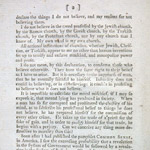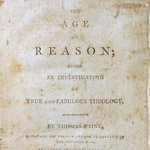 |
 |
In 1791-92, Thomas Paine (1737-1809), an early advocate of republicanism, wrote The Rights of Man in response to criticism of the French Revolution. This work caused Paine to be labeled an outlaw in England for his anti-monarchist views and like Wilkes, he fled to France. In 1793, while imprisoned in Paris (and scheduled to be guillotined), Paine wrote The Age of Reason, a savage attack on the Church, Christianity, and the Bible. Bibliographical databases list early issues for sale at 1s. 6d. Paine's Age of Reason is considered a 'free thought' classic, and this unrecorded early issue, most certainly a pirate copy, was made freer by being sold at the cheaper price of 1s. |

